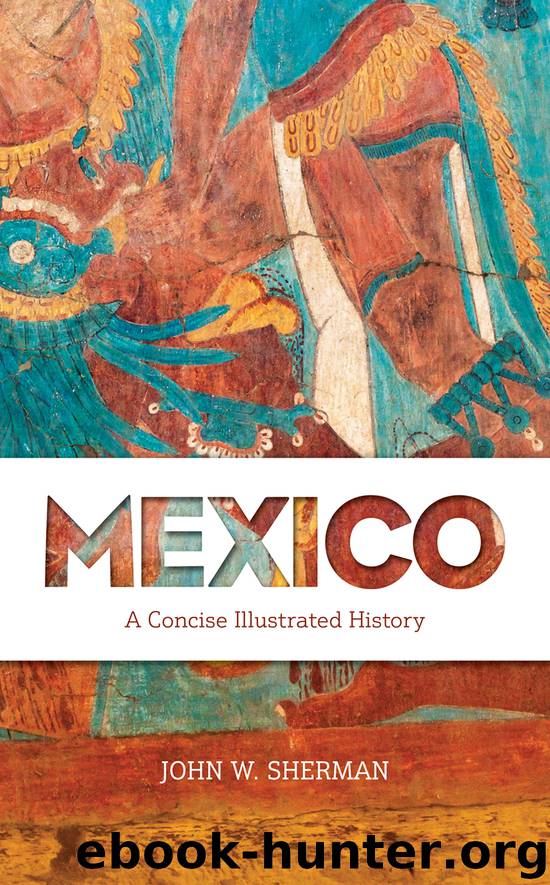Mexico by John W. Sherman

Author:John W. Sherman
Language: eng
Format: epub
Publisher: Rowman & Littlefield Publishers
Published: 2020-01-10T16:00:00+00:00
The French Intervention
The great loser in the War of the Reform was the church. Both sides in the conflict milked it to finance war: the Purists most directly, by seizing and selling properties, but the conservatives as well, through obligatory “contributions” and loans. Unfortunately, overseas creditors came to believe that Juárez’s government was awash in cash as the civil strife wound down. Parisian banks in particular had bankrolled the conservative cause and now demanded that their loans be honored. A half brother of French emperor Napoleon III held Mexican debt through a Geneva banking house. In truth, as had nearly always been the case since obtaining its independence, Mexico was broke. The costs of war greatly exceeded revenues. Nor were the rich paying taxes. A steady cash flow came in via port duties, but Mexico City had little else in its favor. When Juárez suspended all foreign debt payments in July 1861, European powers convened a meeting and determined to act. Britain, Spain, and France sent naval vessels to enforce a blockade, then landed troops unopposed at Veracruz. It was soon apparent that the French had more ambitious plans, as they augmented their landing force and took control of the port with its tariff revenues. As Spanish and British units withdrew, a French army took shape and began to advance on Mexico City.
Haughty French officers, egged on by the pompous Napoleon III—who sought Mexico as a new imperial colony—anticipated little effective opposition. The Vatican supported the invasion, too, priests blessing the French troops, who anticipated friendly crowds in Puebla. Yet when the French arrived on the outskirts of Mexico’s second-largest city, to their amazement, they found thousands of Mexican infantrymen positioned in small forts and ready to fight. Multiple infantry charges up a steep grade failed to dislodge them, the stunned French taking heavy losses. After several weeks of a failed siege, they retired to Veracruz. For the first time, Mexicans had beaten a large and professional foreign army—ensuring that the culminating date of the struggle, Cinco de Mayo, would eventually become a celebratory day.
Embarrassed and appalled, Napoleon III sent ample reinforcements and dispatched a new commander. Juárez declined the offered services of Miguel Miramón and placed the veteran González Ortega in charge. But in spring 1863, with thirty thousand French infantry at Puebla, little could be done except to defend the city via an even more extensive system earthworks. Besieged, placed under heavy and constant mortar fire, and brought to the brink of starvation, the Mexican army surrendered. Juárez fled Mexico City in what would become a potent symbol—an austere black carriage—while clerics and conservatives welcomed the arrival of the French with a celebra-tory mass in the city’s great cathedral.
Figure 11.1. A general named Ignacio Zaragoza commanded the Mexicans at Puebla in spring 1862, when they defeated the French. Zaragoza was an unlikely military hero. Born in remote Tejas, bookish and erudite, he had little in the way of formal military training. After visiting ill soldiers in a hospital in mid-1862, he too succumbed to a fever and died.
Download
This site does not store any files on its server. We only index and link to content provided by other sites. Please contact the content providers to delete copyright contents if any and email us, we'll remove relevant links or contents immediately.
Fanny Burney by Claire Harman(26603)
Empire of the Sikhs by Patwant Singh(23086)
Out of India by Michael Foss(16853)
Leonardo da Vinci by Walter Isaacson(13336)
Small Great Things by Jodi Picoult(7142)
The Six Wives Of Henry VIII (WOMEN IN HISTORY) by Fraser Antonia(5515)
The Wind in My Hair by Masih Alinejad(5095)
A Higher Loyalty: Truth, Lies, and Leadership by James Comey(4964)
The Crown by Robert Lacey(4817)
The Lonely City by Olivia Laing(4802)
Millionaire: The Philanderer, Gambler, and Duelist Who Invented Modern Finance by Janet Gleeson(4478)
The Iron Duke by The Iron Duke(4356)
Papillon (English) by Henri Charrière(4274)
Sticky Fingers by Joe Hagan(4198)
Joan of Arc by Mary Gordon(4110)
Alive: The Story of the Andes Survivors by Piers Paul Read(4032)
Stalin by Stephen Kotkin(3965)
Aleister Crowley: The Biography by Tobias Churton(3640)
Ants Among Elephants by Sujatha Gidla(3467)
